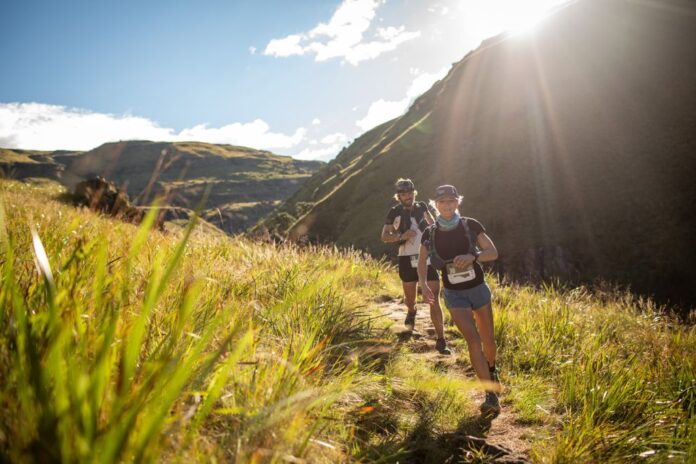
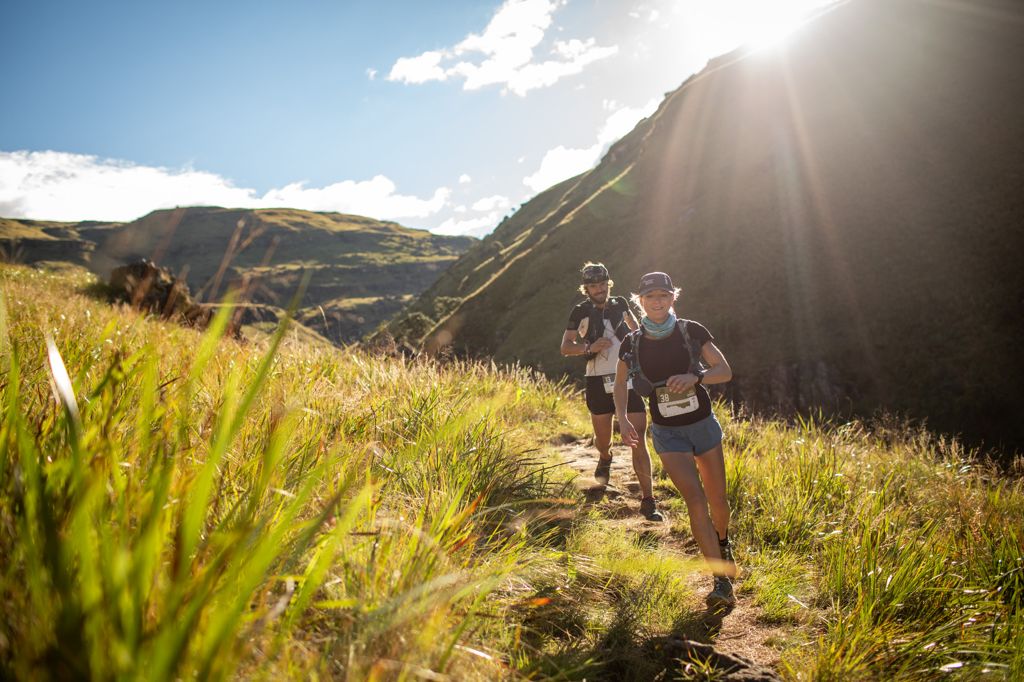
At thirty-two, Jo Keppler has seen more of life than most will witness in a lifetime, having experienced its heady highs and crushing lows in equal measure. In an extraordinary tale of “second chance”, Keppler’s love for ultra-distance running has proved a major factor in her turning her life around following a failed suicide attempt several years ago.
Remarkably, Keppler has already achieved substantial success in her short running career, winning several road and trail titles and placing second in the recent Ultra Trail Drakensberg (UTD) 100 miler to another new-to-the-game athlete, Amri Williamson of Stellenbosch.
“She’s a much better runner than I am – a real natural,” said Williamson of Keppler after beating her decisively in the UTD 100 miler.
Who knows what might have happened had Keppler not rolled her ankle severely on the descent from the highest point in Southern Africa, Thabana Ntlenyana, shortly after surrendering the lead to Williamson. She was treated at an aid station 76km into the race and with her ankle the size of the proverbial football, was advised to retire from the race.
But quitting is no longer in Keppler’s make-up. “There was no way I was dropping out, even though I was also feeling nauseous from the altitude,” Keppler explained. “I quickly rushed out onto the trail before anyone could stop me!”
As a child, Keppler was always running and smiling. She was a ‘feisty child’ and was given the Zulu name “Namoosa” (the kind one) by the women who worked at her mother’s restaurant. She was a leader at primary school, involved in all sports, particularly athletics, swimming and hockey, where she was school captain.
But dark clouds were already gathering in Keppler’s life. She speaks freely and openly about her past challenges in the hope her experiences may help others. “I was sexually abused as a child for several years and that likely played a role in many of my subsequent life explosions,” she admits.
“I experienced my first substance high at eleven, when I tasted wine at a dinner party. While the other kids hated the taste, I loved it and drank from all the kids’ glasses. I felt that ‘I’d arrived’ as my spirits soared. It was less fun when I was sick afterwards and hungover in the morning, but that did not stop me looking for the next high.”
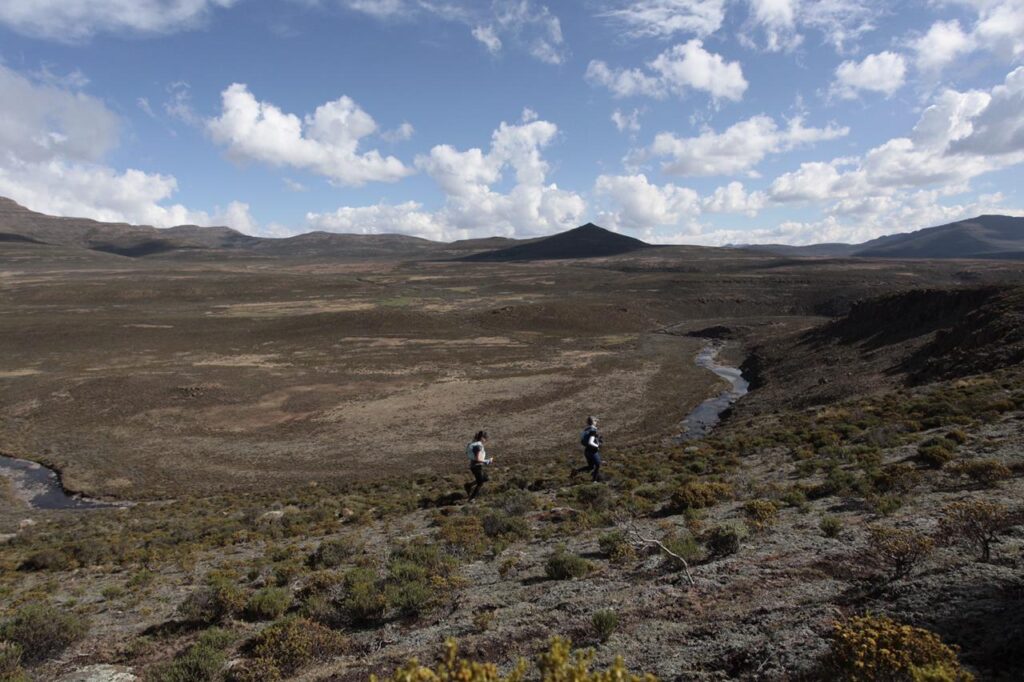
Keppler started secondary school at Howick High, the Alma Mater of Comrades winner, Ann Ashworth. “Ann was in matric when I started in standard six, and coincidentally she worked in my mother’s restaurant where I got to know her.”
According to Keppler, high school life was all about house parties and getting high. Sport gave way, as she was ‘too hung over to get to hockey matches by 7am’.
“I was always in trouble and close to expulsion,” Keppler confessed. “So my parents moved me to St Anne’s in Pietermartizburg. Things improved there and I was strong academically, but by standard eight I was frequenting night clubs and getting high on vodka, ecstasy and cocaine. And by 16 I was struggling with bulimia.”
A gap year in Greece – her parents are of Greek descent – ended in near-tragedy when Keppler suffered serious burns to her arm in a cooking accident and she was ordered to return home by her anxious parents.
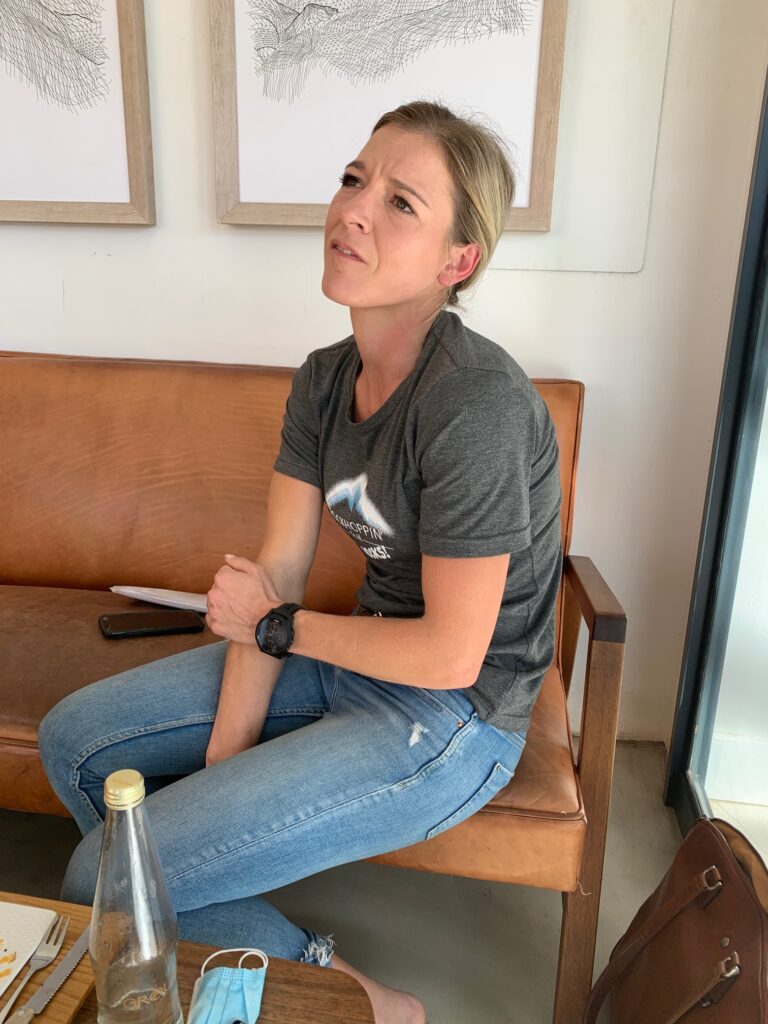
Keppler then attended Varsity College and studied for a B Com degree through UNISA, where her academic prowess shone through, in spite of her lifestyle and she achieved ten distinctions in her first year. But her life remained a litany of ups and downs, exhilaration and devastation competing equally for control of her life.
“At twenty I fell pregnant”, Keppler explained. “But then I saw that I was able to control my addictions, as I completely stopped drinking, smoking and drugs during my pregnancy and also while breast-feeding (her son) Leo.
“I suffered post-natal depression and started running as a way out. No structure, just random runs. I came second in a ‘random 5km race’ even though I was so hung-over! I then entered a marathon without any training and finished in under four hours. But then I stopped running again – again, just as randomly!
“I then met my husband Dave and he adopted my son. I was in and out of rehab, once again struggling against life and everything it threw at me. The second time I felt terrible when discharged – I had been dosed far too heavily on meds. I started having seizures and hit a tree when driving.
“I weighed just 46 kg, suffered pneumonia and seizures and felt that I would die. I had had a recurring dream over the years where I was looking down at my dad carrying my coffin. It was marked with my name with the dates 1988 – 2018 engraved on it. So I always figured I was going to die at thirty. But when I didn’t die, I somehow felt let down. ‘I’m done living’ I told Dave, my husband. I just wanted the pain to be over.”
A suicide attempt through overdosing and walking into the sea failed, only through her husband tracking her down to the beach in the nick of time. But just as all appeared lost, her life began to take a turn for the better.
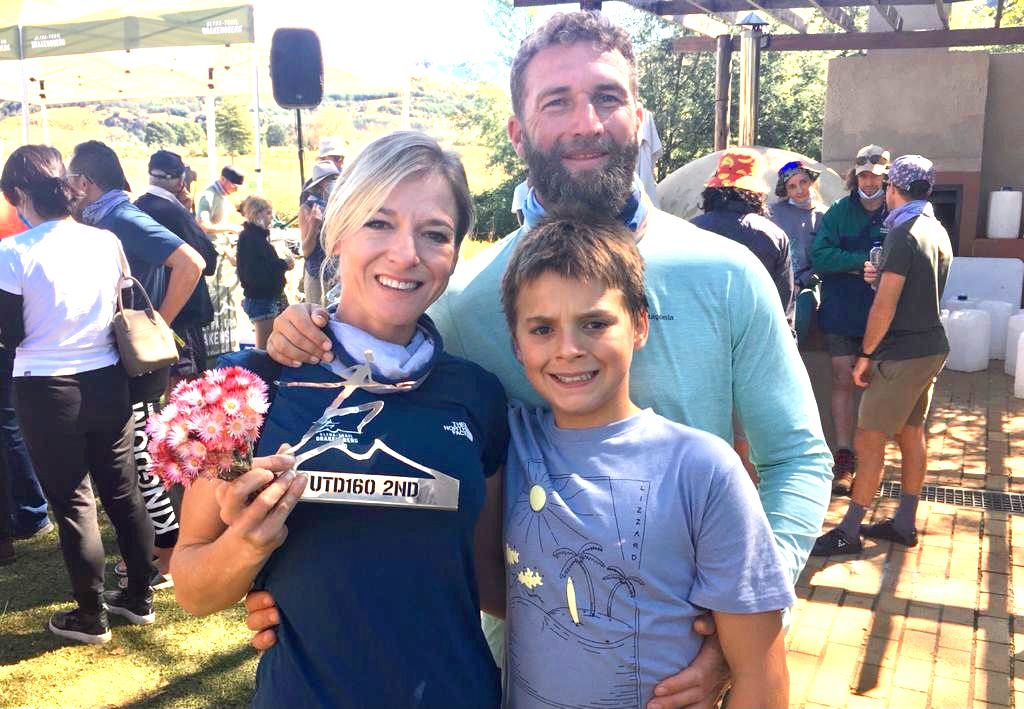
“A friend introduced me to Andre Redinger, my current boss at Millhouse. He just listened and told me ‘you’re going to do great things one day’. And when I went for my last rehab course in 2019, that was something to hold onto – something to focus on. And this time the more spiritually-based rehab was less on medication and stronger on accountability and service. That worked for me and that was the start of a most wonderful journey. In a sense I had died at thirty – this was now a new life for me.
“I started running again during rehab, and had another “I’ve arrived” moment, feeling this was something I really loved and made me feel good. But they were quite strict about that in rehab and limited my running opportunities.”
Keppler lost no time in moving forward with her new-found love for running and days after her discharge in April 2019, had entered the Karkloof 50 miler – just five months later. No half measures for Keppler, she upgraded to the Karkloof 100 miler after placing second woman in the 75 km Umgeni River Run a month before Karkloof was scheduled.
“The first 80km of the Karkloof was great,” Keppler added. “But my body was finished and I ran the second eighty with my mind alone. Nonetheless, I placed fourth woman and finished under 24 hours.”
Keppler’s relationship with her son had improved substantially following her final rehab. “He’s a little gift to me but was an angry boy before that,” Keppler recalled. “Now he just says he loves me and wants to run with me!”
“My parents are my heroes because they look after me and give me love…” nine-year old Leo wrote in a school essay. “My mom is a proffesanal (sic) runner and inspires me to keep going…”
Keppler recognises the important symbolism of the Karkloof 100 miler starting in the dark and ending in daylight. “The finish was incredible. Leo (then 9 years old) ran with me holding my hand for the last 100 metres and across the line. My mum and dad and everyone were just crying so much – I’ll never forget that moment.
“It was then I thought that ‘maybe I can do this thing’ and ran several more marathons, finishing second to Marzelle van der Merwe in the Lesotho 50km and winning the Kearnsey Half Marathon and the Hillcrest Marathon.
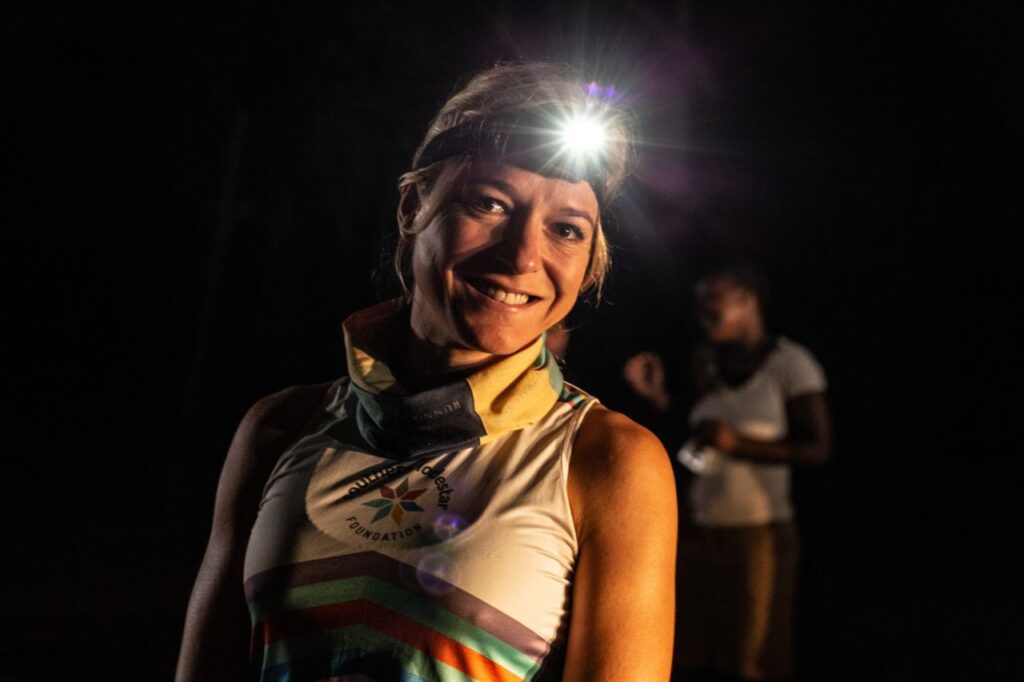
“Then COVID struck and all races were cancelled. I realised that the timing was perfect for me and it taught me patience and sustainability. I continued to train through the lockdown and built my strength. It was during this time that I linked up with (experienced ultra-trail athlete and coach) Linda Doke earlier this year and she has made a huge difference – especially to my climbing ability.”
The lockdown also focused Keppler on the opportunity of using her running for good causes and her 130 km run for the Southern Lodestar Foundation last November provided much-needed hunger-relief for children (see accompanying videos). “When I completed my last rehab, I knew that I had to move from being the victim to the victor,” Keppler added. “I had the power in me to make the choice about how I was going to live my life, and I choose to live my life for doing good.”
Keppler returned to racing this year by finishing second to Ashworth in the Drakensberg Northern Trail 40km in two months ago (“I ran an extra 4km through a marshalling mix-up”) before completing her second 100 miler in impressive fashion at the UTD last month.
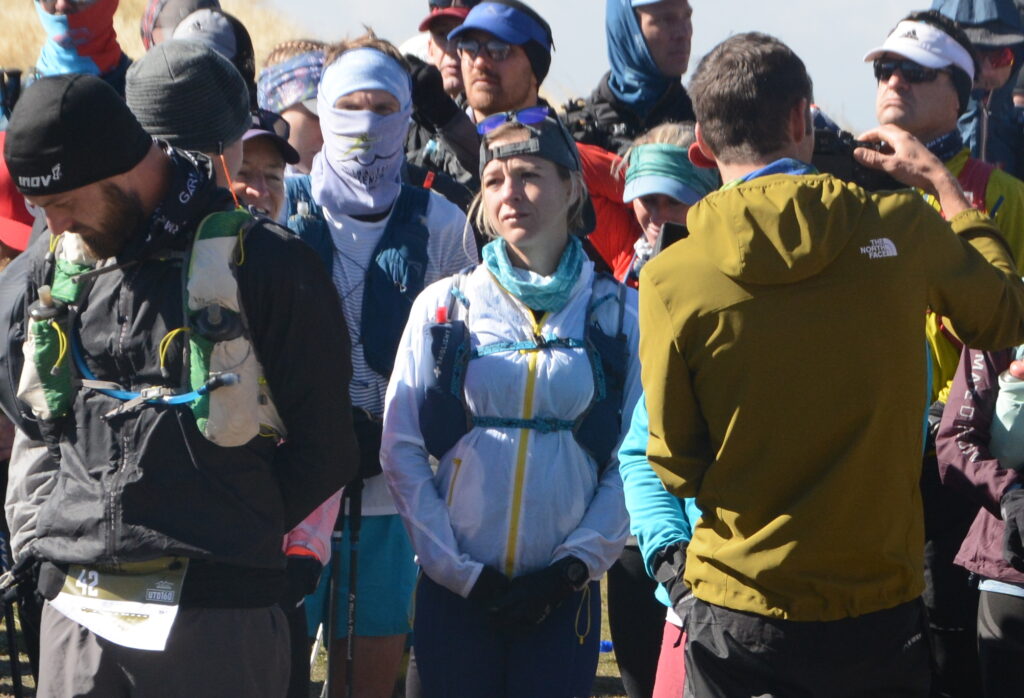
After ‘escaping’ the medical check 76km into the UTD160, Keppler struggled with ankle and nausea challenges along the ridge descent to the Waterfall aid station just over 20km further on. “I was feeling disorientated when I arrived and headed off in the wrong direction!” admitted Keppler. “So I thought it best to join up with another runner and fortunately (Cape Town trail athlete) Armand du Plessis arrived at the right time.
“We more or less ran together for the remaining 60 km. We should have been joint 9th, but Armand took me by surprise by holding back and letting me finish ahead of him. He’s such a gent!” Keppler finished the challenging 164km race in 30 hrs 6 min 42 sec, just over an hour behind Williamson and almost four hours ahead of the third-placed runner.
According to her coach, the sky’s the limit for the diminutive KZN athlete. “Jo has incredible tenacity, courage and perseverance,” Doke said. “She’s also remarkably talented, is goal-oriented and hungry to achieve.”
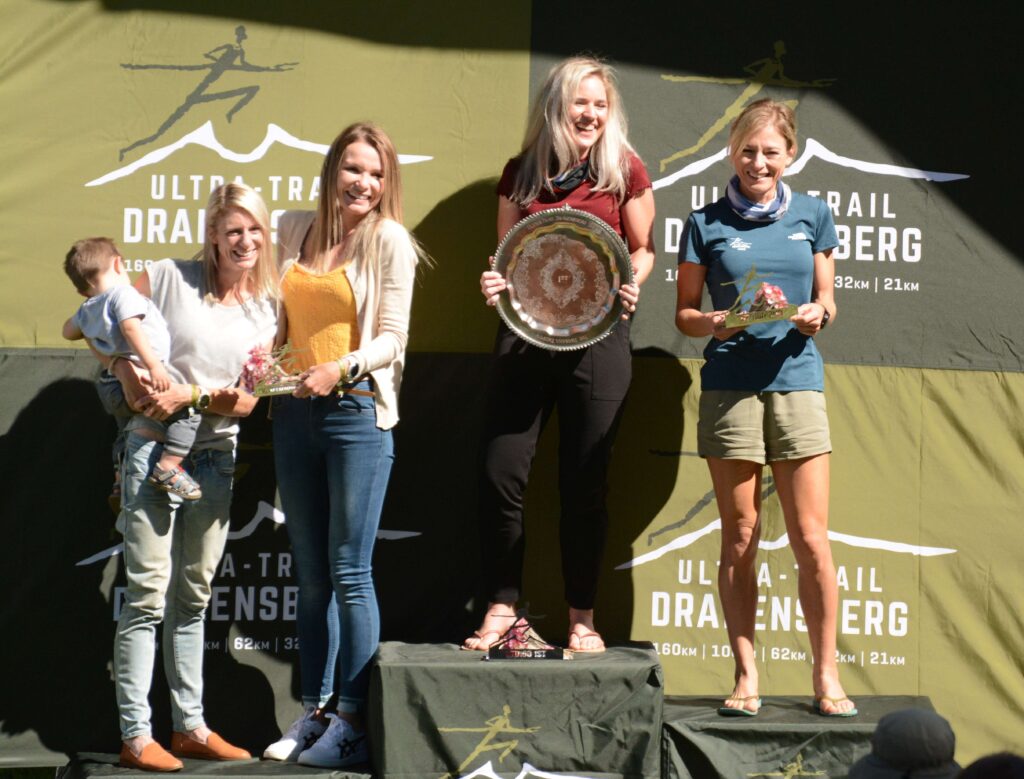
Keppler recognises that her tendency towards addictive behaviour could be an Achilles heel in her career as an ultra-distance athlete. “I always want to run as often and far as possible,” she admits. Doke concurs. “All Keppler’s talents are ingredients for success – the only potential hitch is her enthusiasm to race everything! That’s my challenge as her coach: to reign her in when necessary and help her be selective with her races.”
Now holding a responsible job as supply manager with the Millhouse Group, involving substantial travel to several African countries around nutritional agendas and with the support of her closely-knit family, Keppler’s life enjoys a balance she never knew in her earlier years. And with her new commitment to training discipline under an experienced coach, the name ‘Jo Keppler’ is likely to be associated with winner’s podiums in South Africa and internationally in the years to come.
Story by Stephen Granger
©SPNAfrica News
www.spnafricanews.com


